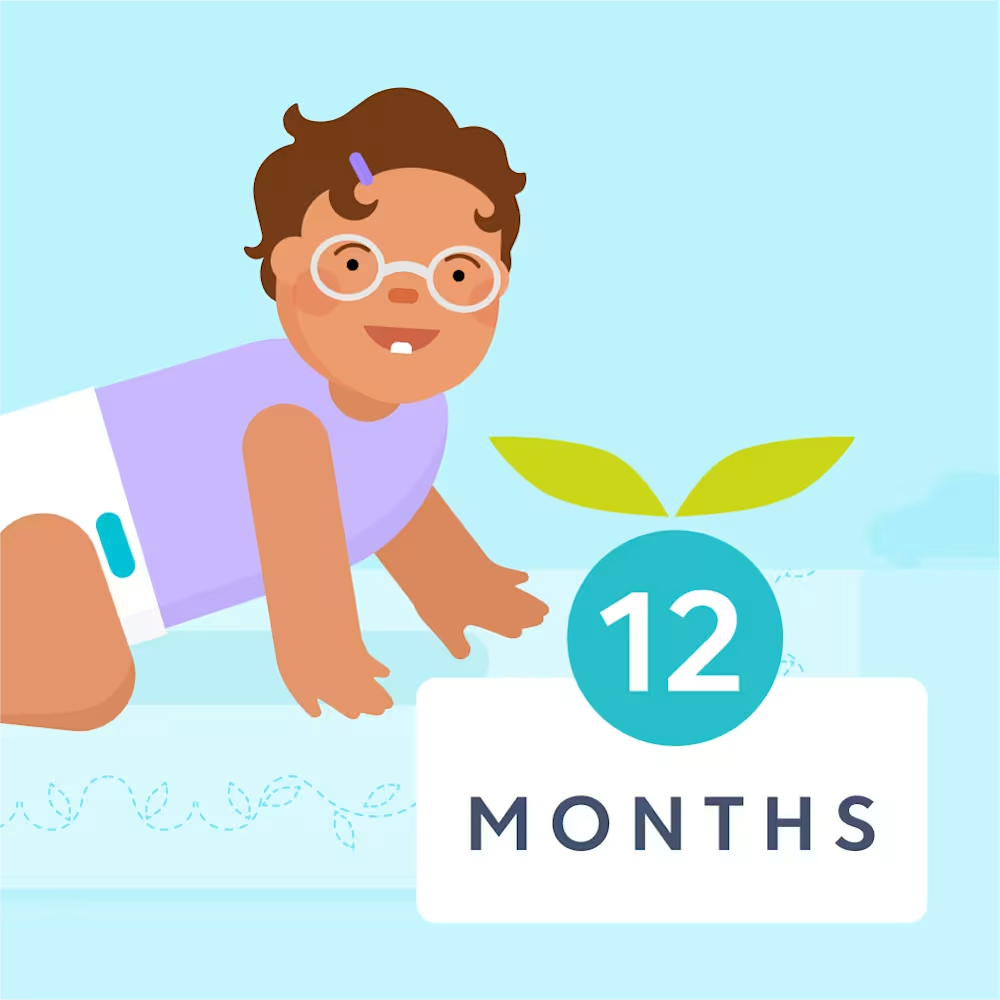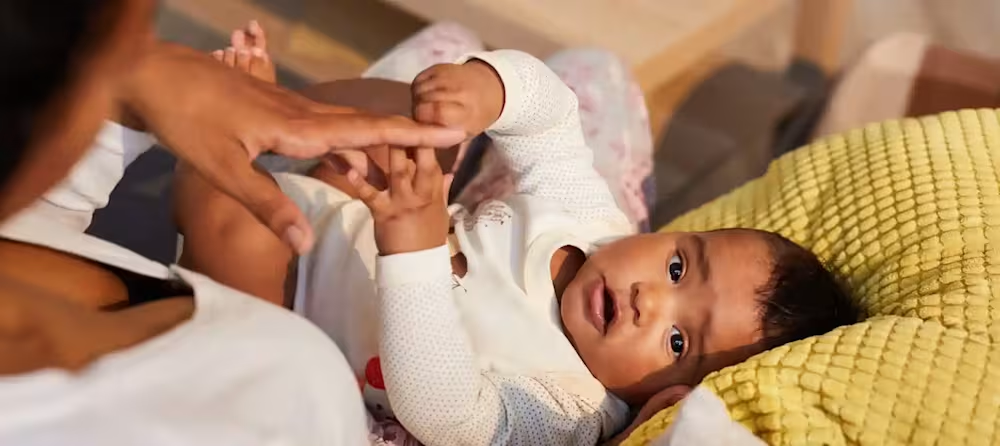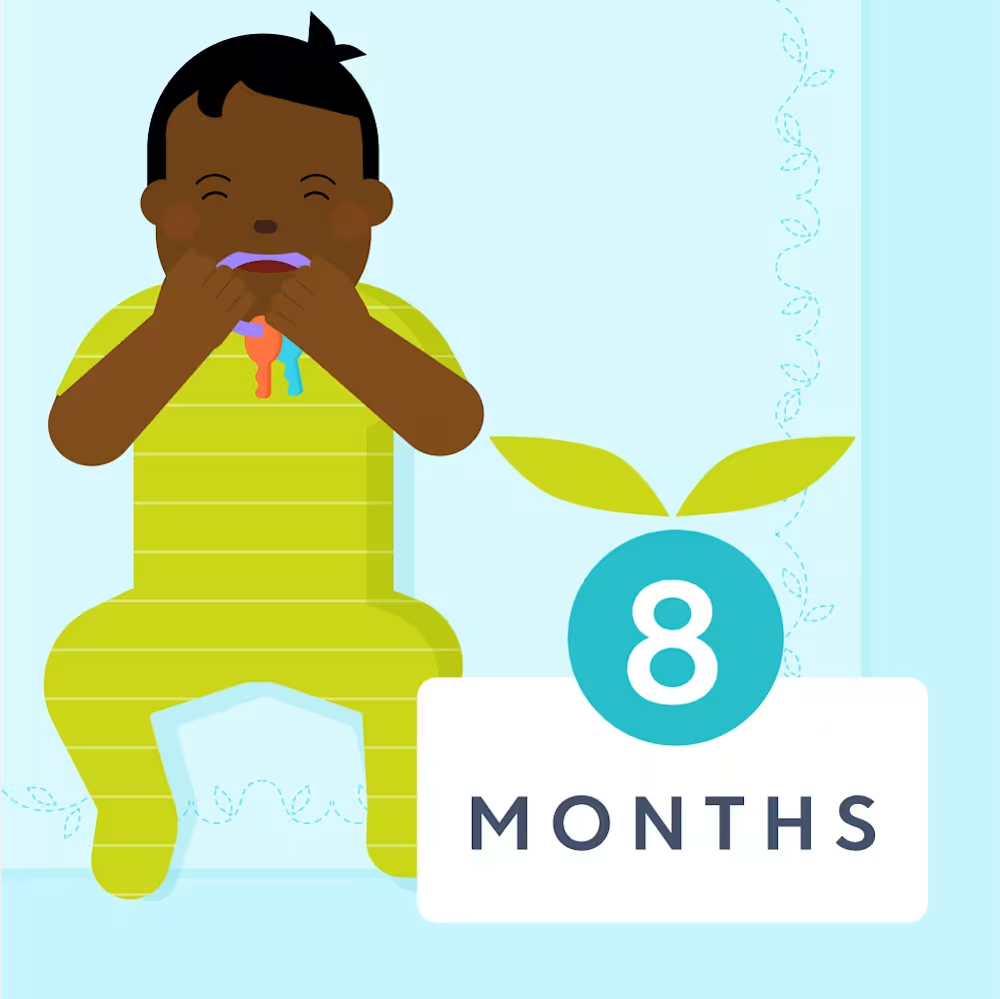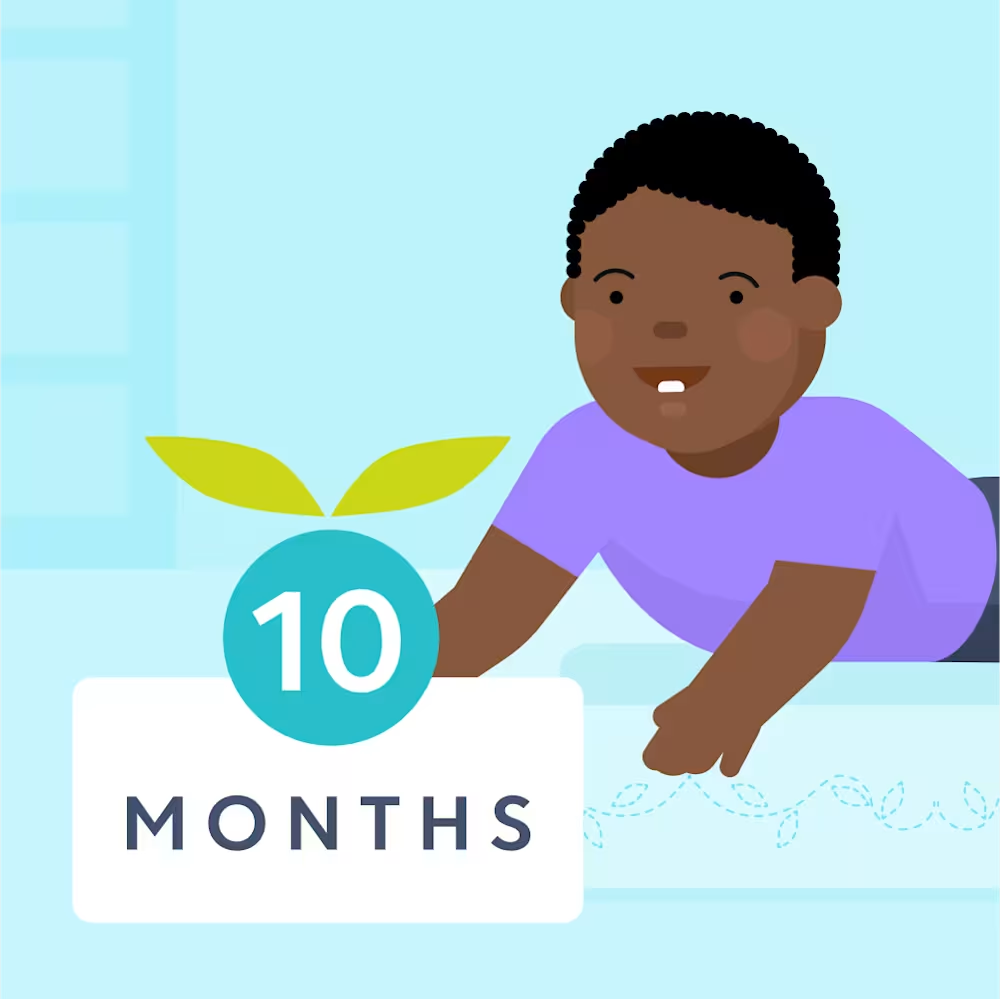12 month sleep regression: Myth or real?
Updated Dec 02, 2025

If your 12 month olds sleep has recently gone off the rails, you’re probably wondering why things went wrong — and how to course correct to get that precious sleep back, so everyone can go back to feeling well-rested. While there isn’t a magical timeline for baby sleep to take a nosedive, around 12 months is a common time where babies may experience a sudden patch of bumpy sleep. For this reason, you may hear “12 month sleep regression” get tossed around, but it’s not quite that black and white.
In this article we’ll walk you through why sleep may regress around a child’s first birthday, give you tips to navigate common sleep disruptors, and answer frequently asked questions about 12 month olds and sleep.
Is there a 12 month old sleep regression?
(periods when your baby’s sleep patterns take a sudden turn for the worse) can happen at any age. However, around a child’s first birthday, it’s common to see new sleep challenges. This isn’t because of a looming date on the calendar, though. Instead, new contributing factors that impact sleep tend to pop up around this age — like exciting motor skill development (standing and walking!) or needing longer periods of awake time before naps. So, sleep regressions can happen at 12 months, but there isn’t a predestined “12 month sleep regression” that all babies will experience.
Why isn't a 12 month baby sleeping?
There are many potential factors that may lead to poor sleep at around 12 months, including:
Dropping the nap too early
Longer wake windows are needed
Mastering milestones
Hunger
Falling asleep with assistance
We'll explain more below:
Reason #1: Dropping the second nap too early
Most kiddos are not ready to transition to a at 12 months, even though that’s a common misconception. Switching to one daily nap before your little one is ready can lead to chronic overtiredness, which in turn can contribute to increased nighttime wakings between sleep cycles and a pattern of early waking — things you’d like to avoid!
Reason #2: Longer wake windows are needed
Let’s talk about daytime sleep struggles: shorter naps, skipped naps, and fighting naps. Babies who have outgrown the 3 - 3.5 hour wake windows may struggle to sleep at their normal nap times due to insufficient sleep pressure. Translation: they’re just not tired enough to snooze, so they skip a nap (or take forever to fall asleep) as a result.
Reason #3: Mastering milestones
It’s common to see night waking and bedtime resistance during periods when babies are mastering developmental milestones. At 12 months, many babies are pulling up, standing, or even walking []. While this increased mobility is so exciting, it can bring new sleep challenges too. Babies would much rather practice these new skills than rest!
Reason #4: Hunger
Hunger can interfere with a good night’s sleep at any age. After their first birthday, most children should be getting the bulk of their nutrition from solid foods (rather than breastmilk or formula), which means it’s a transitional period. If your little one isn’t eating enough during the day (), this may contribute to waking up at night.
Reason #5: Falling asleep with assistance
If your baby falls asleep with your help (e.g., you feed, rock, or hold them to sleep), we’re here to support you as long as it works for your family and it’s safe. However, parent assistance at bedtime often translates to sleep issues, like increased calls for you throughout the night and less sleep overall [].
How long do 12 month sleep issues last?
We’d love to give you a definitive answer. However, sleep regressions don’t have an official start or end date. How long the challenges last depends on the cause and the steps taken to alleviate them.
Since my 12 month old won’t nap does the “12 month regression” affect naps?
It’s common to see 11 - 12 month olds start to outgrow their 3 - 3.5 hour wake windows, which can lead to nap challenges that some refer to as the “12 month sleep regression" or "12 month nap regression.” Think skipped naps, short naps, and nap resistance. Oftentimes daytime sleep issues can be alleviated by a schedule adjustment or updating naptime routines.
My 12 month old won’t sleep. Is it a sleep regression?
Babies this age often skip naps because they require longer wake windows, around 3.5 - 4 hours. This may give parents the false impression that their baby is ready for a 1-nap schedule — it can be tempting to ditch a nap when your baby consistently refuses to sleep during the day. Don’t be fooled! Instead of dropping to 1 daily nap, try lengthening the awake time between sleep periods. Sometimes even a small adjustment like moving the second nap 15 - 20 minutes later can ensure your little one is tired enough for their afternoon snooze.
5 tips to handle 12 month old sleep issues or regressions
Tip | Why it helps | What to try |
|---|---|---|
Don’t drop the nap too early! | Most 12 month olds still need two naps to prevent overtiredness and night waking. | Maintain a two-nap schedule until 14 - 18 months. Adjust nap times and wake windows as needed. |
Lengthen wake windows | Longer awake periods help ensure your baby is tired enough for sleep. | Try 3.5 - 4 hours of wake time between sleep periods. Track your child’s mood and total sleep to find their ideal rhythm. |
Give plenty of milestone practice time | New skills, such as standing or walking, can temporarily disrupt sleep. | Offer daytime floor time to practice movement milestones so nighttime feels like rest, not play. |
Maintain consistent pre-sleep routines | Predictable routines help your child wind down and cue the body for sleep. | Keep pre-sleep rituals short, calm, and in the same order daily, even on busy nights. |
Focus on independent sleep skills | Self-soothing helps babies fall asleep faster and sleep longer. | If rocking or feeding to sleep no longer works for you, consider a sleep training method that fits your family’s comfort level. |
Find more details below:
Tip #1: Don’t drop the nap too early
Some babies may continue to sleep well if they skip a nap here and there, but most children this age aren’t able to comfortably handle napping just once a day all week long. Instead, it’s typically ideal to between 14 - 18 months old.
Try to hold onto the for another couple of months, especially if your child is waking frequently at night (or too early in the morning) because they’ve been skipping naps. You may need to adjust your baby’s sleep times to encourage two naps per day. Check out our sample for a closer look at what you may expect when it comes to sleep at this age.
Tip #2: Lengthen wake windows
Rather than dropping a nap now, consider longer wake windows. If your baby is suddenly struggling to sleep at nap or bedtime, try shifting to 3.5 - 4 hours in between sleep periods for your little one. Longer wake windows can help ensure your baby is tired enough for both naps.
Shifting naps a bit later can temporarily lead to less total overnight sleep, since bedtime will likely move later too. But as long as your baby’s getting at least 10 hours of sleep at night, the 2-nap schedule with longer wake windows usually results in better overall sleep than dropping the nap too early. Along with the number of hours, we recommend keeping tabs on your child’s mood and energy levels when determining if they’re getting enough sleep. Some little ones have higher or lower sleep needs and that’s OK!
Tip #3: Give plenty of milestone practice time
If your baby is tackling a new developmental milestone, like pulling up or walking, be sure to give them plenty of opportunities to practice during the day. This may help them master the skill faster — and help alleviate the desire to work on their new skills when they should be sleeping.
However, even with lots of practice, some lost sleep may be inevitable. After all, standing is way more fun than sleeping! Fortunately, the novelty does eventually wear off.
Tip #4: Maintain consistent pre-sleep routines
Ensure that you’re regularly using a naptime and . Not only do regular sleep routines help improve sleep for kids, but they can provide a as well. Aim to do the same routine (in the same order!) every day. We recommend shortening routines — instead of abandoning them altogether — on days where you’re rushing home for bedtime or naps are skipped and your baby needs to go to sleep earlier than usual.
Tip #5: Focus on independent sleep skills
There’s nothing wrong with helping your child to sleep (e.g. rocking, feeding, or holding). However, if it’s no longer working for you, consider teaching them how to fall asleep without these associations. Kids who fall asleep on their own tend to call for their parents less and sleep longer. To do this, there are a variety of options, ranging from gentle methods that may take longer to more intense methods that tend to produce faster results but may include more tears in the short term.
How much sleep does a 12 month old need?
We’ll aim for at least 13.25 hours of total sleep per 24-hour period at . This often looks like 11 - 12 hours at night and 2 - 3 hours of daytime sleep over 2 naps. However, if your baby is sleeping more or less than this, chances are that’s normal too. You know your baby best! Keep tabs on their overall mood and energy levels to ensure they’re getting the rest they need to grow and thrive.
How can I tell if it's separation anxiety or 12 month sleep problems?
Around 12 months, separation anxiety may still be present. Depending on your child, it may even increase as they transition from crawling to walking. At this stage, toddlers are beginning to understand that when you leave, you always come back, though they may still feel uneasy in the moment. Consistent routines and practice with short separations can help build their confidence and reinforce that time apart is only temporary.
Even as they become more able to understand what’s happening and to how cope with your absence, you may notice clinginess during the day, tears when you leave, or some resistance at bedtime. Offer reassurance, stick to predictable routines, and know that this phase reflects healthy emotional growth.
How can I tell if it's teething or 12 month sleep problems?
Teething discomfort can continue to impact sleep around 12 months — it's not so much that it's teething or sleep challenges. By this age, your baby may be cutting several teeth — often the first molars or lateral incisors — which can cause soreness and extra nighttime wake ups or fussiness around daytime sleep. Offer extra comfort and cuddles when your baby needs them, but try to maintain your usual bedtime routine. This avoids creating new sleep associations (like rocking or patting to sleep) that may be tricky to undo once the discomfort has passed.
Can you sleep train during a sleep regression?
Yes, can be an option for improving sleep challenges at 12 months. There are several ways to help your baby learn to fall asleep independently — from gentle, gradual methods to quicker approaches that may involve more initial crying. Sleep training is a personal decision, and only you can decide what feels right for your baby and your family.
Can I let my 12 month old cry it out during a sleep regression?
By around 12 months, most babies are developmentally ready for sleep training, even if they’re going through a sleep regression. There are a variety of approaches to consider, and the “right” one depends on your child’s temperament and your family’s comfort level.
If you’re looking for a quicker approach, more structured methods like check and console (e.g. the ) work well for many families. Total extinction (aka “”) can also be effective — especially if check-ins seem to make your baby more frustrated. If you choose this method, ensure your baby’s basic needs are met (fed, dry, comfortable), and use a video monitor along with occasional safety checks to keep an eye on them.
Gentle methods — like gradual withdrawal or pick-up-put-down — allow you to support independent sleep and self-soothing while still offering comfort and reassurance
As always, take your baby’s overall health and development into account, and check in with your pediatrician if you have any concerns before starting sleep training.
What are self-care tips for tired parents?
Celebrate yourself: You’ve been parenting for 12 whole months — 365 days! It’s no easy feat. Remind yourself you’re doing a great job, even on days where it feels hard.
Prioritize rest: Rest isn’t a reward! Being productive can be satisfying, but also give yourself permission to rest. It’s a necessity, especially during demanding seasons like parenting a 12 month old.
Phone a friend: Connecting with other parents or loved ones can give you a boost. Feeling seen and heard can help ease stress and reassure you you’re not alone.
Should I let my baby sleep in my bed during a regression?
The American Academy of Pediatrics (AAP) recommends avoiding bedsharing for the first 12 months to reduce the risk of SIDS []. After a year, they don’t have specific guidance, though they still don’t officially support bedsharing. That said, the risk of SIDS drops a lot by this age, even though things like falling, suffocation or entrapment can still happen.
Many families do choose to bedshare at this age, especially if it helps everyone get a little more sleep during tough phases like regressions. If you choose to bedshare, try to keep things as safe as possible: use a firm mattress, keep pillows and heavy blankets away from your child, and avoid sharing the bed with anyone under the influence of substances that affect alertness.
When to talk to a doctor
At this age, changing sleep needs, developmental milestones, and growing independence can all affect how well your baby sleeps. Still, you know your child best. If you’re ever unsure about their sleep habits, worried they’re not getting enough rest, or something just feels off, it’s always a good idea to check in with their healthcare provider.
Here are a few signs that may be worth bringing up with their doctor:
Feeding or weight gain concerns: If your 12 month old is consistently refusing meals, having fewer wet diapers, or not gaining weight as expected (though it’s normal for in your baby’s second year), it’s a good idea to check in with their doctor.
Excessive fussiness or signs of discomfort: If your baby seems unusually fussy, hard to soothe or appears to be in pain, it could be a sign of an underlying issue that warrants medical attention.
Unusual symptoms: If your little one has a fever, rash, persistent cough, or is vomiting, they should be evaluated by a doctor.
Excessive sleepiness: Check in with their healthcare provider if your baby is sleeping significantly more than usual, seems overly drowsy, or is hard to wake.
Trust your gut: Even if everything turns out to be just fine, it’s often best to err on the side of caution. Follow your instincts and consult your child’s doctor if something feels off.
Takeaway
Sleep regressions can happen at any age. However, babies may experience sleep issues around their first birthday due to various factors, including transitioning to a 1-nap schedule too early, needing longer wake windows, mastering developmental milestones, hunger, and falling asleep with assistance.
Sleep regressions don’t have definitive start and end dates. Instead, sleep challenges are determined by the specific contributing factors and steps taken to improve sleep.
Sleep regressions are a normal part of your child’s development — even in their second year of life. You can help your little one through these challenging phases by adjusting their sleep schedule, encouraging them to fall asleep independently, and giving them plenty of time to practice new motor skills during the day.
Share article:
Note: The content on this site is for informational purposes only and should not replace medical advice from your doctor, pediatrician, or medical professional. If you have questions or concerns, you should contact a medical professional.
3 Sources
Share article:









